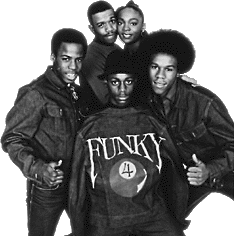It dominated 1979 and the early 1980s with a string of classic releases from artists such as
Treacherous 3, Grandmaster Flash & the Furious Five, and of course the Sugar Hill Gang.
Check out these other writings on Sugarhill Records.


|
In the leafy suburb of Englewood, New Jersey stands a large wooden building on the corner of West Street. But while local residents go about their daily business, behind its closed doors the most controversial, blistering dance music is being created. Welcome to the home of Sugarhill Records, which moved out here from the area of Harlem from which it takes its name. It's become the most energetic and forceful label of the 80s. Where under the wing of its creator Sylvia Robinson, rappers, singers, scratchers, musicians, and engineers come from the Bronx, from Harlem, from places you thought only existed in films to make THEIR voices heard. This is Sugarhill Records, the only true independent label where everything happens under one roof. Artists sign their contracts there, they record there, they mix with other musicians, exchange ideas and come out with a music that kicks so hard you've got to dance. Sugarhill is delivering the sound of New York right into your home. It's delivering the streets, the grime, the clubs, the good times and the hard times direct to your head and your feet. And don't let anyone tell you it all sounds the same. -- Simon Mills, "Record Mirror" |

|


|
As rapping moved center stage, rappers and DJs began to form neighborhood crews who hosted block parties, school dances, and social clubs. Like breakdance crew competitions, rappers and DJs battled for local supremacy in intense verbal and musical duels. These early duels were not merely a matter of encouraging crowd reaction with simple ditties such as "Yell, ho!" and "Somebody scream." These parties and competitions lasted for several hours and required that the performers had a well-stocked arsenal of rhymes and stories, physical stamina, and expertise. Local independent record producers realized that these battles began to draw consistently huge crowds and approached the rappers and DJs about producing records. While a number of small releases were under way, Slyvia Robinson of Sugarhill Records created the Sugar Hill Gang whose 1979 debut single "Rapper's Delight" brought rap into the commercial spotlight. By early 1908, "Rapper's Delight" had sold several million copies and rose to the top of the pop charts. "Rapper's Delight" changed everything; most important, it solidified rap's commercial status. DJs had been charging fees for parties and relying on records and equipment for performance, but the commercial potential at which "Rapper's Delight" only hinted significantly raised the economic stakes. "Rapper's Delight" has also been cited by rappers from all over the country as their first encounter with hip hop's sound and style. In fact, the commercial success of "Rapper's Delight" had the contradictory effect of sustaining and spawning new facets of rap in New York and elsewhere and at the same time reorienting rap toward more elaborate and restraining commercial needs and expectations. -- Tricia Rose, Black Noise |